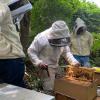CBS Policy Brief: Climate, Wildfires, Water & Health in Barbados (2023)
Centre for Biosecurity Studies Policy Brief: Climate, Wildfires, Water & Health in Barbados
June 2023 Issue #0001.
With the increasing drying and hotter climate trends predicted for the Caribbean, the importance of establishing wildfire monitoring and early warning systems (EWS) for Barbados and the Caribbean becomes increasing more critical. Natural and anthropogenic fires can play intricate roles in the structure and dynamics of many ecosystems (McWethy et al., 2013, Pausas and Keeley, 2019).
Climate change and wildfires can have a reinforcing and synergistic relationship (Xu et al., 2020). Climate change–related rainfall anomalous intensity and distribution patterns can create droughts and increase their frequency in tropical and subtropical areas (Trenbeth, 2011). Wildfires can be fostered by existing climatic conditions in addition to other co- factors including waste management challenges, presence of fuels, ignition agents and human activity (Calviño- Cancela et al., 2017, Prestemon et al., 2002).
Some climate conditions promoting fire activity include reduced rainfall, increasing and extreme temperatures, heat waves and windy conditions which may occur in relation to large‐scale climate models such as the El Niño South Oscillation (ENSO) (Fang et al., 2021, Fasullo et al., 2018). Few studies examining wildfire variability in the Caribbean exist and more integrated research is strongly desired.




